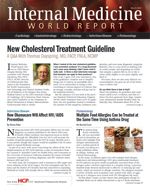Preventing the Spread of Vaccine-Preventable Disease Among Diabetic Patients
While the dangers of influenza and pneumococcal pneumonia in patient with diabetes are well understood, less known is the fact that diabetics are at increased risk for contracting hepatitis B if they share blood glucose meters, finger stick devices, or other diabetes-care equipment.

When diabetic patients contract vaccine-preventable illnesses like hepatitis B virus (HBV), influenza, and pneumococcal disease, they are at an increased risk of complications, hospitalization, and mortality compared to those who do not have a chronic illness.
While the dangers of influenza and pneumococcal pneumonia in patient with diabetes are well understood, less known is the fact that diabetics are at increased risk for contracting HBV if they share blood glucose meters, finger stick devices, or other diabetes-care equipment such as syringes or insulin pens, which patients often do to save money.
To prevent the spread of vaccine-preventable disease among diabetics, the January 2014 issue of Diabetes Educator presented the American Association of Diabetes Educators’ new recommendations for vaccination. The authors of the short document reinforced basic measures, including:
- All people with diabetes aged 6 months or older need annual influenza vaccinations.
- People with diabetes aged 2 years and older need a pneumococcal polysaccharide vaccine administered only once. The researchers also recommended 1 revaccination for patients who were previously immunized when they were younger than 65 years old, or if they received the vaccine more than 5 years previously. Patients who have comorbid nephrotic syndrome, chronic renal disease, or are otherwise immunocompromised should also be revaccinated after age 65.
- All unvaccinated adolescents, adults at risk for HBV infection, and adults seeking protection from HBV infection need a HBV vaccination series.
As vaccines provide a cost-effective preventive service, they should be the core components of every diabetic patient’s care plan. Thus, the authors advised healthcare providers to use sound clinical judgment and ensure that diabetic patients are aware of the few risks and enormous benefits associated with vaccination.
